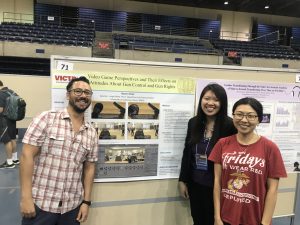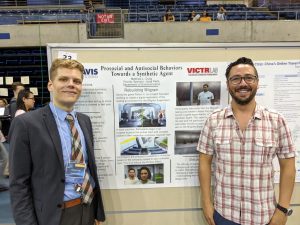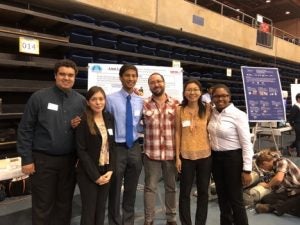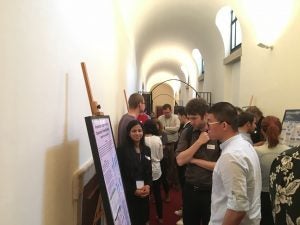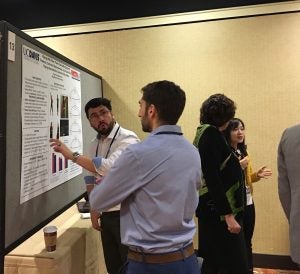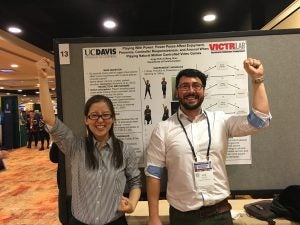September 9, 2019
Replication Study in Spain: Video Game Roles Influenced Willingness to Help Immigrants
In a recent study published in New Media and Society, Jorge Peña and Juan Francisco Hernández Pérez used a Spanish sample to replicate their study examining how game character perspective-taking influenced the political opinions of study participants. Random assignment to play a game as an immigration inspector decreased intention and attitudes toward helping immigrants relative to baseline scores. These effects were observed while controlling for social dominance orientation or preference for inequality among social groups. The intention and attitudes of participants randomly assigned to play a control group game featuring the role of a newspaper editor remained unchanged. Overall, this study expanded perspective-taking research by replicating theoretical predictions with a different sample.
April 25, 2019
2019 Undergraduate Research Conference
Two VICTR lab research projects were featured at the Undergraduate Research Conference at UC Davis. Matt Craig presented his project exploring how embodying moral or immoral game character archetypes influences people’s willingness to inflict pain to an AI character. Matt’s study builds on Stanley Milgram’s research.
Karen Chan presented on how to build games for research purposes, such as creating a game that allows players to take on the perspective of game characters with different moral justifications for violence (e.g., police officer vs. gang member) influences player’s feeling of guilt after committing virtual violence.
November 13, 2018
Video Game Roles Can Influence Willingness to Help Immigrants
In a recent study published in Cyberpsychology, Behavior, and Social Networking, Jorge Peña, Juan Francisco Hernández Pérez, Subuhi Khan, and Ángel Pablo Cano Gómez, examined how game character perspective-taking influenced the political opinions of study participants. Random assignment to play a game as an immigration inspector decreased intention, subjective norms, and self-efficacy to help immigrants relative to baseline scores. The scores of participants randomly assigned to play a game similar in style but instead featuring the role of a newspaper editor remained unchanged. Within subjects effects implied that baseline reductions in intention, subjective norms, and self-efficacy to help immigrants effects were solely attributed to playing as game immigration inspectors. The study controlled for players’ social dominance orientation or inclination for inequality among social groups. This experiment provided initial evidence that taking on the perspective of game characters can influence players’ opinions about political issues, such as immigration.
September 26, 2018
Innovative Learning Technology Initiative Grant
Jorge Peña was awarded a $63,000 ILTI-6 grant for the development of an online course focused on the social uses and effects of video games and VR/AR.
The course will be available to UC students across all campuses. This is a great opportunity to showcase cutting edge research in this area, including the work we do at the VICTR lab!
August 22, 2018
A communication model of social demands in video games
Video Games: A Medium That Demands Our Attention is a recent book that outlines the cognitive, emotional, physical, and social dimension of this enormously popular activity. Editor Nick Bowman has given voice to a diverse array of contributors discussing past, present, and future scholarship on this topic.
Jorge Peña has a chapter outlining how the social demand of playing video games stems from the presence of real and artificial game partners. The presence of others allows for the emergence of traditional communicative processes but also for the rise of new social phenomena, such as embodying digital self-representations or ‘avatars’ and interacting with computer-controlled characters. His chapter revisits previous definitions of social demands and articulates a communication framework that subsumes common themes in research describing social processes involved in playing video games. He defines social demands as any part of the communicative process (i.e., message, medium, context, sender, receiver, feedback, and noise) that has an impact on the quantity and quality of the social ties of players and game audiences.
Jorge is honored to have been a keynote speaker along with scholars such as Allison Eden, C. Shawn Green, Matthew Grizzard, and Nick Bowman for the 2017 BEA Research Symposium that kickstarted this book.
June 7, 2018
Abrázame: A community-building app for survivors and victims of domestic violence
“Abrázame,” which means “hug me” in Spanish, is an interdisciplinary mobile phone application designed to prevent domestic violence through novel communication features and functions. The app’s social media function allows users to share and exchange personal stories about experience with domestic violence and offers tailored proximal resource recommendations using natural language processing. Currently the app has an English and Spanish version. The app also generates an approximate and user-safe “heat map” of approximate location of domestic violence stories. Map locations are generated broadly to avoid putting users to risk. App aggregated de-identified data may be of use to policymakers and organizations.
On June 7, 2018, we participated in the Engineering Senior Design Showcase in ARC Pavilion at UC Davis. We demonstrated to judges and visitors a prototype of the app. Judges and visitors offered us invaluable advice about encryption processes, continuous integration practices, and reaching out to new partners.
Abrázame would not have been possible without the support from our CITRIS and The Banatao Institute Tech for Social Good sponsors. Our team is made up of mostly UC Davis, from many majors including communication, computer engineering, computer science, managerial economics, and political science.
June 4, 2018
How Persuasive Are Health Advertisements Embedded in First-Person Shooter Games?
In a recent study published in Communication Research Reports, Jorge Peña , Subuhi Khan, Christopher Burrows, and Hart Blanton examined whether persuasive health messages embedded in first person shooter games have broad or targeted effects on players’ willingness to engage in risk behaviors. Participants presented with in-game health messages discouraging alcohol-impaired driving of motor vehicles showed reduced willingness to drink alcohol and to operate both motor and non-motor vehicles compared to those in a no-message control game condition. There were no spillover effects on willingness to smoke cigarettes or marijuana, thus implying targeted persuasive effects. In addition, players experiencing high instead of low cognitive load showed decreased post-experiment willingness to drink and operate non-motor vehicles, thus suggesting that playing a game under high cognitive load can influence players’ attitudes. The findings replicated previous research (Burrows & Blanton, 2016) and further expanded on knowledge-activation and thought-disruption mechanisms underlying the persuasiveness of health messages.
May 28, 2018
ICA 2018 presentations
We presented two VICTR lab studies at the 2018 International Communication Association conference in Prague, Czech Republic. Both studies focused on using new technology to users change users’ behaviors and attitudes.
Subuhi Khan and Jorge Peña presented a study exploring how technological features and message-related factors influenced engagement and performance with a game app targeting depression. Participants who received persuasive messages implying that depression has internal or endogenous causes before playing with the app perceived the game app as more usable and had increased intentions to continue using the app relative to participants who received messages implying that depression has external or exogenous forces. Rendering the app in a large screen increased time spent playing and game performance relative to smaller screens. This finding replicates our work on the effects of message endogenous-exogenous causality manipulations and expands its effects by considering media features such as screen size.
In addition, Salvador Alvídrez and Jorge Peña presented a study testing how interactions in virtual reality can decrease prejudice against Latinos. Participants that customized avatars to look like themselves showed decreased prejudice relative to those that customized avatars to look like someone else. Presence of common social identity cues, such as avatars dressed in the participants’ school colors, helped decrease prejudice by increasing identification with one’s own group. The findings are congruent with the identifiability and common in-group identity assumptions of the SIDE model.
March 9, 2018
CITRIS ‘Tech for Social Good’ Project Funding
Congratulations to Ke “Maddie” Huang, Kimmiko James, Jeffrey Warner, Alejandra Amparo, Sagar Gupta, Sahil Faruque, and Jorge Peña for receiving funding for their Tech for Social Good proposal. The CITRIS and the Banatao Institute Tech for Social Good Program provides funding support to undergraduate, graduate, and postdoctoral students developing hardware, software, events or programs that support healthy, sustainable, connected, and equitable livelihoods in the United States and abroad. The team will develop “Abrázame,” a mobile app for users to securely share domestic abuse stories and receive social support. The app will be available in different languages, including Spanish, English, Standard Chinese, and Hindi.
Left to right: Jorge, Sagar, Alejandra, Ke, Kimmiko, and Jeffrey (Not pictured: Sahil Faruque).
March 1, 2018
‘Avatar, Assembled’ Book Chapter
A recent book chapter by Jamie Falin and Jorge Peña outlines the social uses and effects of avatar body size. The chapter combines scholarly research and game design examples to illustrate how players and game designers use avatar body size to communicate overt and subtle messages. ‘Avatar, Assembled’ was edited by Jamie Banks (West Virginia University). This is a curated volume that discusses the sociotechnical dimension of embodiment in video games and virtual environments. We’re honored to feature our work alongside a truly impressive list of scholars included in this volume.
November 20, 2017
Exposure Effects of Online Model Pictures and Weight-Related Persuasive Messages on Women’s Willingness to Lose Weight
Can exposure to pictures of women with different body sizes (thin, obese) and physical attractiveness levels (attractive, unattractive) embedded in a fashion website affect women’s willingness to lose weight? In a recent study published in Journal of Health Communication, Wenjing Pan and Jorge Peña found that women exposed to thin and attractive model pictures indicated the highest attitudes and self-efficacy to lose weight, whereas those exposed to thin and unattractive model pictures indicated the lowest. Furthermore, exposure to persuasive messages either implying that people should lose weight or that people should be satisfied with their weight moderated the effect of model picture exposure on controllability of weight-loss activities. These effects imply that exposure to pictures of online models can trigger social comparison processes that may affect women’s willingness to lose weight.
October 11, 2017
Annual Innovations in Psychiatry and Behavioral Health: Virtual Reality and Behavior Change at Stanford University
Does virtual reality help or hinder memory of health information? The VICTR and D.I.C.E. labs are partnering to study this question. We built a simulated classroom in partnership with Computer Science students (Michael Lee, Shreya Sudarshana, William Chilcote, and Sam Lee). The classroom runs on 2D desktop monitors and on 3D goggles.
At a recent Stanford University conference, Shreya Sudarshana presented pre-test data showing that participants presented with health information about anxiety in the 3D version of the classroom reported higher enjoyment, spatial presence, and arousal relative to those in the 2D classroom condition. However, participants in the 3D condition remembered fewer pieces of information actually contained in the lesson and also misidentified more information that was actually not in the lesson relative to participants in the 2D condition. We’re very excited about Shreya’s accomplishment and look forward to continuing answering this question as early studies show contradictory evidence about information recall and recognition in 3D environments.
September 10, 2017
Research spotlight on VICTR lab
While this website highlights finished research products, there’s a lot of invisible work that remains in the background. Research is hard work: long hours, lots of meetings, questions & clarifications, designing the study but also designing/selecting the tech or game, heightened attention to theoretical or methodological details, anticipating possible shortcomings and peer criticism, etc. People pour themselves into their research, both intellectually and physically. In short, there’s a distinct human element at the core of most research programs.
In a recent ‘research spotlight’ article, Noah Pflueger-Peters vividly describes the human dimension of working at the VICTR lab. I am very grateful for his piece, and I especially value Noah’s focus on the personal side of working at the VICTR lab. Check it out! Click here to read Noah’s article.
AUGUST 23, 2017
Superhero primes and “power poses” affect prosocial behavior after a motion-controlled game task
In a recent study, Jorge Peña and Meng Chen examined how priming concepts, such as “superheroes” and “supervillains” and then holding different physical poses while playing a motion-controlled game influenced participants’ subsequent prosocial behaviors. After the experimenter “accidentally” dropped pencils, participants primed with superheroes were faster at helping compared with a control condition. Participants who controlled the game while standing and holding expansive poses helped more relative to those in the expansive pose/sitting condition. Sitting participants primed with supervillains showed decreased prosocial intention.
While previous research implies that granting people superpowers in virtual contexts (e.g., the ability to fly) influences prosocial behavior, this study untangles these factors by separately investigating the priming effects of prosocial and antisocial stereotypes along with the influence of the physical poses that people use to trigger in-game actions. The study also provides initial evidence for the hypothesis that players’ physical poses while operating motion-controlled games increases readiness for subsequent action. The study was published in Computers in Human Behavior.
May 11, 2017
Effects of Human vs. Computer-Controlled Characters and Social Identity Cues on Enjoyment
How does playing with human vs. computer-controlled characters affect game enjoyment? Also, does playing with characters that feature social identity cues (presence or absence of avatars wearing participants’ school colors) influence game enjoyment? In a recent study published in Journal of Media Psychology, Jorge Peña, Jannath Ghaznavi, Nick Brody, Rui Prada, Carlos Martinho, Pedro A. Santos, Hugo Damas, and Joana Dimas found that playing a cooperative online video game with human-controlled avatars instead of computer-controlled agents was more enjoyable. Furthermore, the presence of social identity cues increased enjoyment indirectly by augmenting identification with one’s avatar. Unexpectedly, playing in multiplayer mode in the presence of social identity cues decreased enjoyment, whereas playing in multiplayer mode in the absence of social identity cues increased enjoyment. The findings supported media enjoyment and social identity theories, and highlighted how virtual character type and identification processes influence enjoyment.
This work was supported by national funds provided through Fundacao para a Ciencia e a Tecnologia (FCT) (UID/CEC/50021/2013) and by the INVITE project (UTA-Est/MAI/0008/2009) funded by FCT under a UT-Austin/Portugal cooperation agreement.
April 7, 2017
Video Games a Viable Treatment for Depression
By Karen Nikos-Rose
Video games and “brain training” applications are increasingly touted as an effective treatment for depression. A new UC Davis study carries it a step further, though, finding that when the video game users were messaged reminders, they played the game more often and in some cases increased the time spent playing.
“Through the use of carefully designed persuasive message prompts … mental health video games can be perceived and used as a more viable and less attrition-ridden treatment option,” according to the study.
Screenshot from an experimental mental health app. The app contained games designed to improve cognitive control in people with depression.
The paper, authored by graduate student Subuhi Khan and Jorge Peña, associate professor in the Department of Communication at UC Davis, is forthcoming in Computers in Human Behavior.
The messages, and subsequent games assigned, targeted depression that could be perceived as either internal — caused by a chemical imbalance or hereditary factor; or depression that could come from outside factors – such as a job or relationship situation. The messaging had slight differences in approach, but ended on basic inspirational notes to inspire the participant to play the game. Each message ended with: “Just like a regular workout, much of the benefit of these tasks comes from using them without taking breaks and putting in your best effort.”
Using six, three-minute games, the study found in most cases that playing the specifically designed game helped subjects feel they had some control over their depression. Each game was an adaptation of neurophysiological training tasks that have been shown to improve cognitive control among people experiencing depression.
Portraying depression as something caused internally because of biological factors and providing a video game-based app for brain training made participants feel that they could do something to control their depression. This supports other research that shows that brain-training games have the potential to induce cognitive changes, the authors said. Those users also gave high ratings for the usability of the app.
On the other hand, portraying depression as a condition caused by external factors led users to spend more time playing the game – again, perhaps giving them a feeling of control over their situation. But researchers said this result was likely due to immediate engagement and was unlikely to have long-term benefits.
The study did not examine whether playing the games actually reduced depression, although that will be looked at in future studies, the authors said.
The study looked at results from 160 student volunteers who said they suffered from mild depression. They received class credit for participating. Three-fourths were women, and more than half of the subjects were of Asian heritage, followed by white, Latino, and other ethnicities. The average age was 21.
This study has captured the attention of media outlets including UPI, The Huffington Post, and Science Daily, among others.
Karen Nikos-Rose is associate director of UC Davis News and Media Relations and covers humanities, arts, social sciences and professional schools of management, law and education. Follow her at @UCDavis_KNikos.
February 4, 2017
“Power poses” influence the experience of playing motion-controlled games
In a recent study published in Computers in Human Behavior, Jorge Peña and Meng Chen find that players’ physical gestures while playing motion-controlled video games influence players’ subjective experiences. Playing the same game while striking a “power pose” augments enjoyment, controller responsiveness, spatial presence, but decreases game arousal.
“Power pose” research has come under fire because of problems replicating the effect. To solve this issue, we used a much larger sample compared with past research. We also controlled for participants’ awareness of the power pose effect, along with pose non-compliance (i.e., participants breaking the randomly assigned pose). With these controls in place, we reach the conclusion that “power poses” can influence players’ subjective experiences. However, the statistical effect is modest and susceptible to contamination (e.g., player awareness, pose non-compliance).
November 12, 2016
NCA 2016 game body mechanics research
We presented two VICTR lab studies at the 2016 National Communication Association conference in Philadelphia. Jorge Peña presented recent evidence on how the physical gestures used when playing motion-controlled video games influenced game enjoyment, controller responsiveness, spatial presence, and arousal.
Meng Chen discussed how playing a motion-controlled game while keeping an expansive pose affected downstream risk-taking behaviors. While much research focuses on the effects of playing video games based on amount (e.g., hours playing games), content (e.g., violent, educational), context (e.g., cooperation vs. competition) and structure (e.g., 2D, 3D), our latest research highlights how game mechanics such as the physical gestures required to play a game can influence user experiences and subsequent behaviors. This is an exciting new research area that blends Dr. Peña longstanding interest in automatic processes with the use of motion-sensing and tactile interfaces.
July 8, 2016
Can computer and video game-based training reliably increase cognitive readiness?
In a recent study published in Communication Research, Jorge Peña and Nick Brody find that exposure to military training videos had cognitive and emotional effects on trainees. Participants watched emotional or tactical military training videos and then played a training video game. Exposure to the emotional training video reduced participants’ ability to suppress emotion and need to control one’s thoughts. After playing the training video game, participants previously exposed to the emotional video had higher metacognitive self-consciousness scores. Nationalism was negatively associated with emotion reappraisal for participants exposed to the emotional training video. However, patriotism was linked to higher emotion suppression scores. No behavioral transfer effects were found. The results illustrate how media priming connects to short-term cognitive readiness outcomes and how trainee nationalism and patriotism modulate exposure effects.
June 8, 2016
How does exposure to model pictures influence online social support messages?
In a recent study in Computers in Human Behavior, Jorge Peña and Wenjing Pan find that exposure to models’ photos in a fashion website influenced the words that women subsequently employed in response to online forum requests for weight-related advice. Female participants were exposed to photos of thin/obese and attractive/unattractive models when ostensibly selecting pictures for a college fashion website. Participants then wrote a social support message in response to a forum posting advocating for extreme weight loss or body acceptance. Language use in social support messages showed decreased social orientation after exposure to attractive models. Overall, participants’ word choice revealed social comparisons and the activation of weight-related stereotypes.
JAN 19, 2016
Three VICTR lab studies accepted to ICA 2016!
Three VICTR lab studies were accepted to ICA 2016 in Fukuoka, Japan. Wenjing Pan and Dr. Peña will discuss how exposure to pictures of thin/obese and attractive/unattractive women in a fashion website subsequently affected women’s attitudes toward extreme dieting.
Dr. Peña and Wenjing Pan will also discuss how exposure to pictures of thin/obese and attractive/unattractive women in a fashion website affected the linguistic content and style of people providing online weight advice.
Finally, Subuhi Khan and Dr. Peña will discuss how linguistic agency manipulations (e.g., “depression lurks [either] inside or outside of you,” “depression is triggered by [either] genetic or environmental factors”) affected people’s usability perceptions and engagement with depression health apps.
JAN 16, 2016
Study replicates avatar effects on gamers’ physical activity in the real world
In a recent study published in Journal of Computer-Mediated Communication, Professor Jorge Peña and graduate students Subuhi Khan and Cassandra Alexopoulos show that men assigned to an obese avatar in a tennis video game showed decreased physical activity in the real world compared with those assigned to a thin avatar. This occurred regardless of the player’s actual body size.
Participants also showed social comparison effects including decreased physical activity when their avatar was perceived as more obese than the opponent character. Overall, this implies that exergames can be leveraged to increase physical activity among gamers.
This replicates a previous study by Dr. Peña showing a similar effect among women. Journal of Computer-Mediated Communication is ranked 2/76 in Communication and has a five-year impact factor of 3.799.
Nov 19, 2015
VICTR lab research at NCA 2015
Graduate students Subuhi Khan and Cassandra Alexopoulos presented their research at the 101st Annual Convention of the National Communication Association. Both studies were supervised and co-authored by Dr. Peña.
Subuhi applied automated linguistic analysis techniques to demonstrate the mental activation mechanism underlying behavioral effects in an exergame. This study provides a peek into the cognitive dimension of the Proteus effect by showing how active mental concepts spilled in participants’ subsequent written language. The study also explored the link between language use and game performance.
Cassie examined how media interactivity, prosocial task difficulty, and situational cues (renovating or demolishing a virtual building) affected prosocial outcomes after playing a creative video game (Minecraft). The results supported the assumptions of cost-reward, interactivity, and environmental priming models in creative video game contexts, and illustrate how video games can increase prosocial behaviors and attitudes.
Dr. Peña was featured in a panel discussing how to harness virtual worlds to increase real-world health. The panel featured experts including Grace Ahn (U. Georgia), Hart Blanton (UConn), and John Christensen (UConn). Peña presented his research on how virtual characters can be used to increase physical activity when playing motion-controlled video games (i.e., exergames). Shyam Sundar (Penn State) praised the theoretical keenness and innovative results of panel. The NCA presentations were well attended and sparked a lively discussion of how virtual experiences can be leveraged to affect human behavior.
Sept 06, 2015
Prof. Peña featured in Italian science television program.
“UC Davis, famous world-wide for Agriculture research, is now becoming an excellence center for the study of the digital world,” notes Italian science television show in an interview with Dr. Peña.
Professor Jorge Peña’s research was prominently featured in Superquark, an Italian science and technology television show. Superquark is broadcasted by RAI and has been on air since 1995. It is one of the most respected science documentary shows in Italy.
The episode focuses on Peña’s research on how avatar appearance can increase physical activity in exergames. It also features his experiments examining the persuasive effects of avatar appearance and cognitive load. The episode features recreations of these studies for the camera.
Dr. Peña’s segment goes from 61:43 to 69:47. Graduate students Subuhi Khan and Cassie Alexopoulos, along with undergraduates Quyen Uong, Daniel Haddad, and Yuan Wu also appear in the segment.
http://www.rai.tv/dl/RaiTV/programmi/media/ContentItem-d807dc61-7c3b-4f82-9d32-e046bad7010d.html#p=0
May 08, 2015
Profs Feng, Peña, Hilbert & Barnett at ISS Conference
This Institute for Social Sciences Inaugural Conference takes place on three consecutive Fridays: Apr 24, May 01, May 08, 2015. It will showcase the world-class research by social scientists across UC Davis and by top researchers from across the country. Keynote speeches will be delivered by Amy Cuddy (Harvard Business School), James Fowler (UC San Diego, Political Science), and Matthew Jackson (Economics, Stanford University).
Dr. Feng and Dr. Peña will contribute to the session on “How Perception Shapes Reality” (Friday, April 24), Dr. Hilbert to the session on “Big Data: Measuring Us” (Friday, May 1, 2015), and our Chair, Dr. Barnett will do the “Wrap up Q&A” on Friday, May 8, 2015.
Space is limited: sign up NOW! http://socialscience.ucdavis.edu/events/iss-conference
Jan 15, 2015
Prof. Peña’s research is featured in Institute of Social Science Website
By Alex Russell – Jorge Peña, an assistant professor of communication, has recently been teaming up with researchers across disciplines to observe the impact that virtual experiences, which includes playing video games, can have on people in the real world. READ MORE
May 04, 2014
Dr. Jorge Peña spoke at TedXUCDavis
Dr. Jorge Peña spoke in front of a live audience about how virtual experiences have unintended consequences in real life. TEDxUCDavis in an independently organized TED event. The event took place on May 4 at the Mondavi Center

